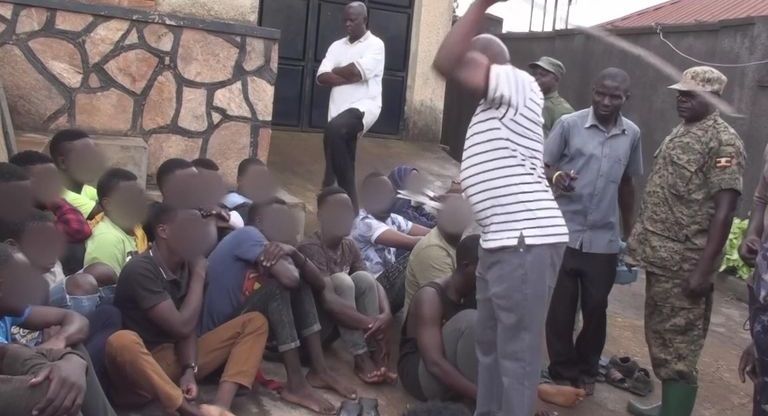Homeless queer Ugandans brutally whipped by mayor before being falsely arrested under coronavirus laws

In a 2020 raid, Ugandan men were whipped by officials before being chained and walked to the police station. (Screen capture via YouTube)
Shivering and scared, 23 LGBT+ people sat on the forecourt of a charity-run facility near Kampala, Uganda.
A municipal mayor carries a four-foot cane as he paces in front of them before beginning to brutally whip and interrogate them, tying them up and marching them through the streets, locals jeering as they walk across the dirt path.
Harrowing footage has emerged of a March 29 raid which led to the arrest of 19 LGBT+ harried Ugandans, part of a slew, activists say, of targeted attacks by law enforcement against the community.
Authorities did not charge the group with the country’s barbed anti-LGBT+ laws. Instead, they were charged with disobeying coronavirus regulations on social distancing.
It’s all seemingly part of a new playbook of autocratic authorities exploiting the pandemic to hastily push authoritarian laws and persecute marginalised and vulnerable groups.
As much as the coronavirus crisis has brought the world to a juddering halt, activists say, the scant opposition to emergency measures being used to persecute LGBT+ people will be cataclysmic.
Homeless LGBT+ forced to walk through Uganda streets, chained and bruised, as locals taunt them.
The tinny mobile phone footage shows mayor Hajji Abdul Kiyimba, Sky News reported Monday, looming over the Children of the Sun Foundation residents.
“Who are your parents?” he shouts.
“Give me your parents’ number. Quickly, give it. Rubbish!”
The LGBT+ shelter residents, many homeless, remain silent, trembling. Kiyimba then begins to flog the petrified occupants, forcing them to show their faces to the camera.
“Who is in charge here,” he bellows, “tell me about the condoms?
“Where did they come from? Tell me what you were using condoms for?”
An unseen interrogator then quizzes a resident: “Who were you having sex with?”
“I wasn’t having sex with anyone,” he responded.
Against a cackle of laughter from officials, the interrogator added: “Tell us who you were having sex with?”
The shelter occupants, chained and bound to one another in a snaking line, are then walked through Kampala. Locals hurl homophobic taunts against them from afar.
“We would like to see their husbands who rented them such a big house,” one says.
Another spouts: “Our daughters are not married, why don’t you marry them instead of engaging in homosexuality.”
Defendant’s lawyer says chargers are there to ‘teach [LGBT+ people’] a lesson’.
In the topsy-turvy court case that has followed, four of the men living with HIV were released on medical grounds.
The remaining defendants’ lawyer, Patricia Kimera, lampooned the charges facing her clients, accusing authorities of having “repurposed” emergency powers to persecute minority groups.
“It was a trumped-up charge, doing an act that is likely to spread an infectious disease,” she said.
“These are people who were found in a shelter, in a home, in a place they take as home. For me, I still believe that there was no violation at all of any of the rules.”
Ugandan prison systems are stuffed with inmates, she said, in a trying situation that has only strained her further as authorities stonewall her from seeing her clients.
“These charges are usually put against LGBT+ people to ‘teach them a lesson’,” she said.
“OK, go there on remand even if the case doesn’t proceed, even if it gets dismissed.
“But let us teach you a lesson.”
Activists accuse Uganda authorities of ‘repurposing’ coronavirus to punish LGBT+ people.
Sky News approached Kiyimba for comment, but he did not wish to, the outlet said.
“We’ve been told about homosexuals in our area and we’re asking ourselves what to do about it,” the municipal information secretary, Vincent Nyanzi, explained.
“We’ve told people we’re dealing with it with utmost urgency.”
Yet, it is this veneer of “urgency” ratcheted up by the COVID-19 crisis that has alarmed LGBT+ activists. Mawethu Nkosana, an advocate at human rights group CIVICUS, wearily warned that the use of coronavirus measures to charge the group.
“We need to assess these legal instruments,” Nkosana said. “When will they be repealed? The fact is, they usually don’t have a repeal date.”
Moreover, United Nations human rights experts have called on the group’s release.
“I think it is important that there is an immediate consideration of the release of these people and certainly, their access to lawyers,” said UN special rapporteur Victor Madrigal-Borloz.

